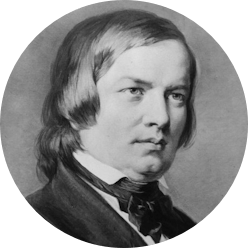
Robert Schumann
8 de junio de 1810 - Zwickau (Germany) — 29 de julio de 1856 - Franckfurt am Main (Germany)
Acerca de
Robert Schumann, a poetic background
Robert Schumann, the leading figure for all the musicians of the “1810 generation”, practically never left Germany where he shone for his critical writing and his musical compositions. A highly gifted child, he wrote novels, stories and poems at the age of twelve. His father owned a bookshop and passed on his taste for literature introducing him to the poetry of Paul Richter and E.T.A. Hoffmann who would remain part of his universe.
Schumann: music and madness
An outstanding pianist, Robert Schumann quickly turned to composition and produced an opus 1 for piano, Variations on the name “Abegg”, when aged only nineteen. He imposed his own style in the rhythmic and harmonic originality of his visionary and imaginative short pieces and fragments. It is very difficult to distinguish Schumann’s artistic from his sentimental life since all aspects of his existence were so largely dominated by his, at first opposed union, with the brilliant virtuoso and composer, Clara Wieck. This continued right up to the silence imposed by illness, which lead to his death. In 1854, possessed by increasing insanity, Schumann threw himself into the Rhine after having composed enigmatic pages like the Songs of Dawn. Saved by fishermen, he spent the last years of his life in a psychiatric hospital.
His music was amongst the most original and complex of his generation and commanded the admiration of Franz Liszt, Felix Mendelssohn and Johannes Brahms who was to be his disciple. The world of literature was a permanent source of inspiration from whence his works developed a system of musical codes secretly dedicating them to his beloved Clara. Tormented and often composed at the last minute, Robert Schumann’s music is a carnival of rhythms and colours where his invented doubles (Florestan and Eusebius) representing madness and wisdom, dance beyond the confines of happiness and death.

